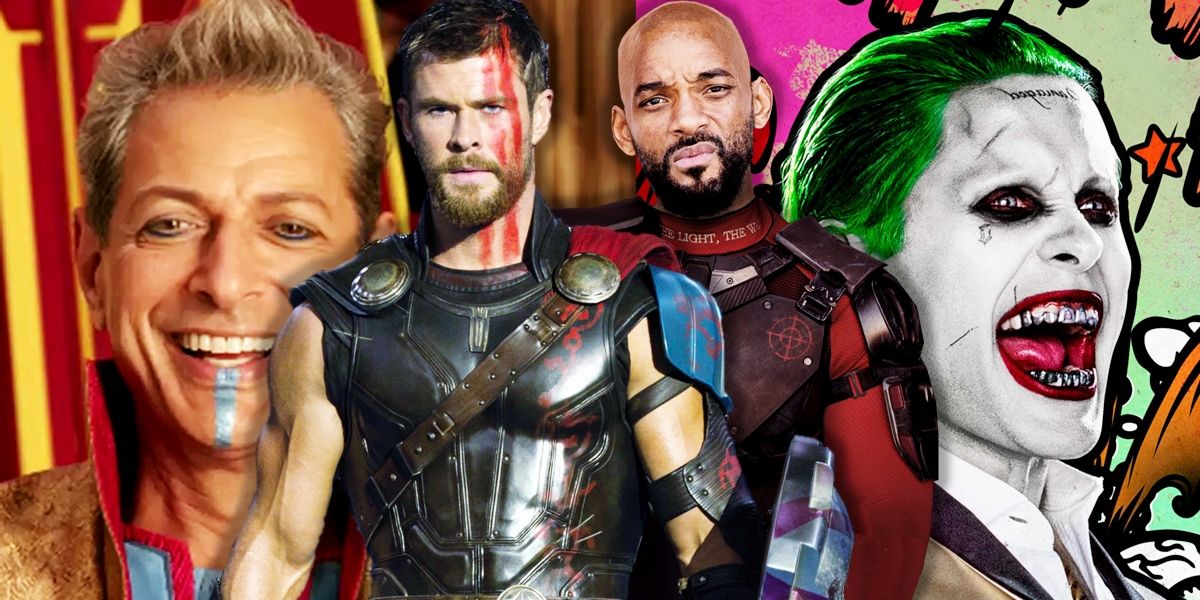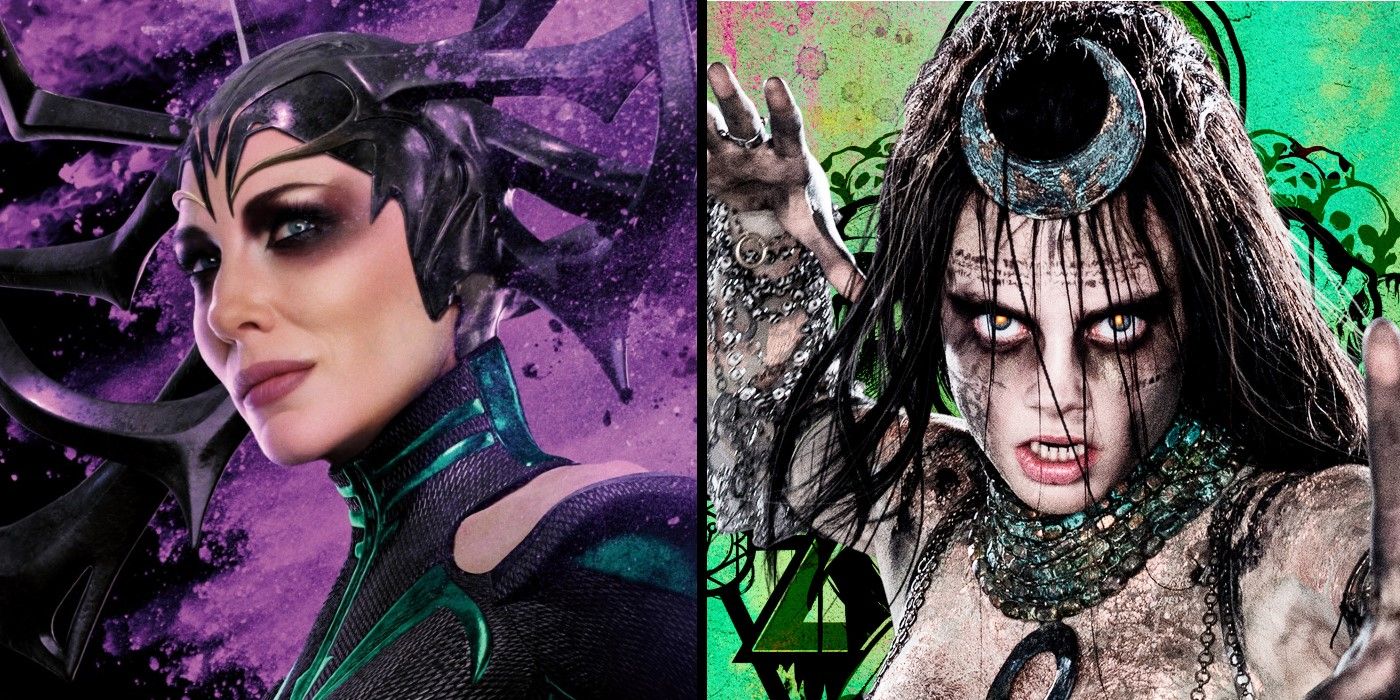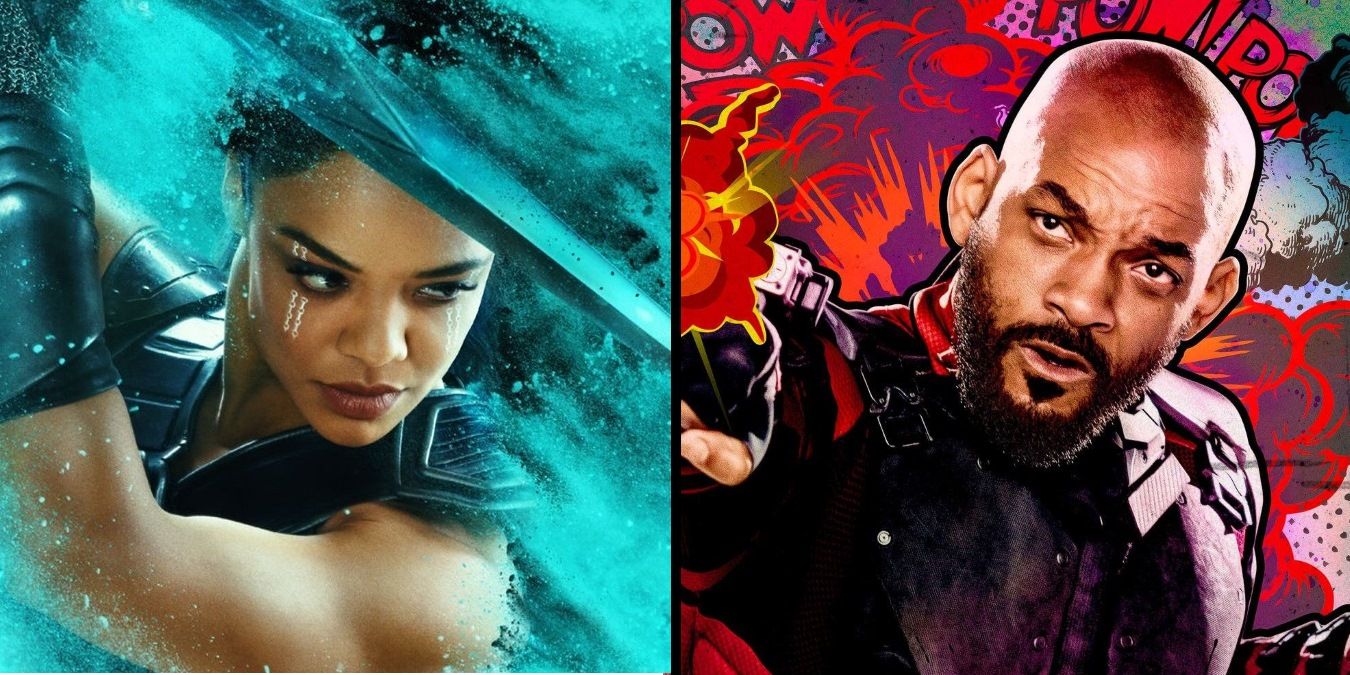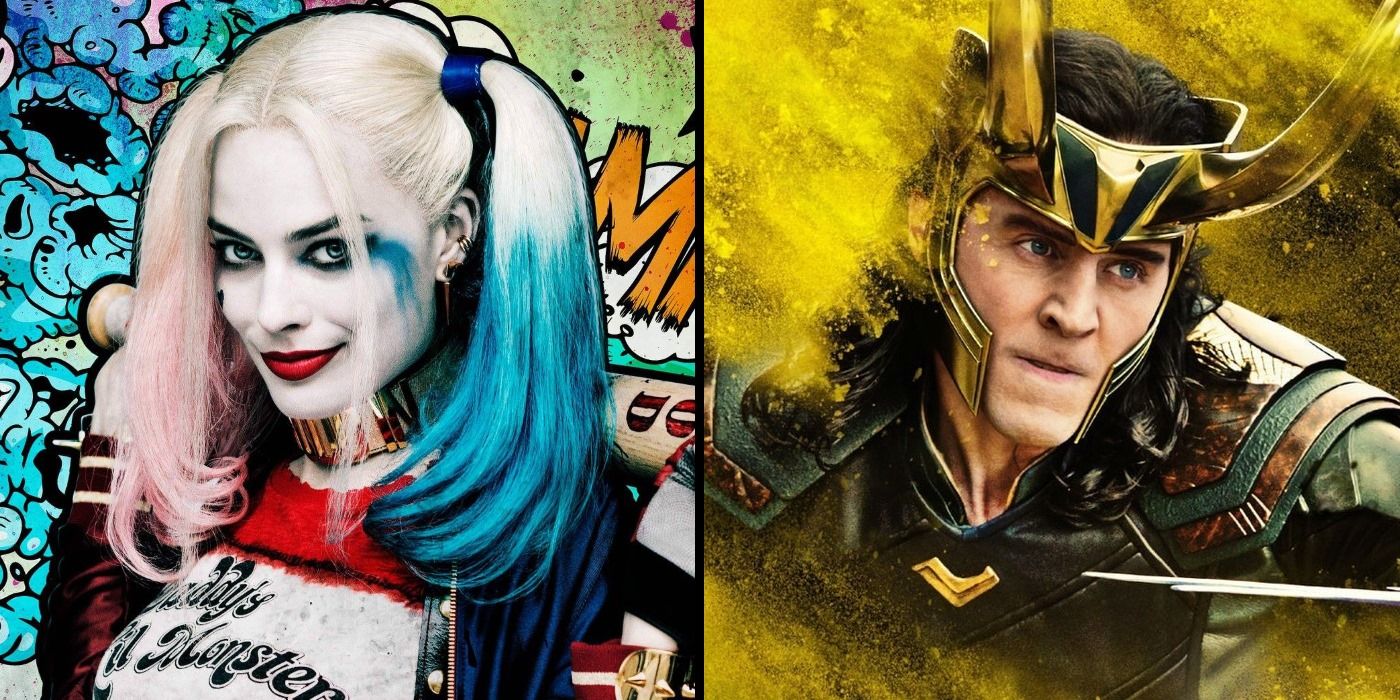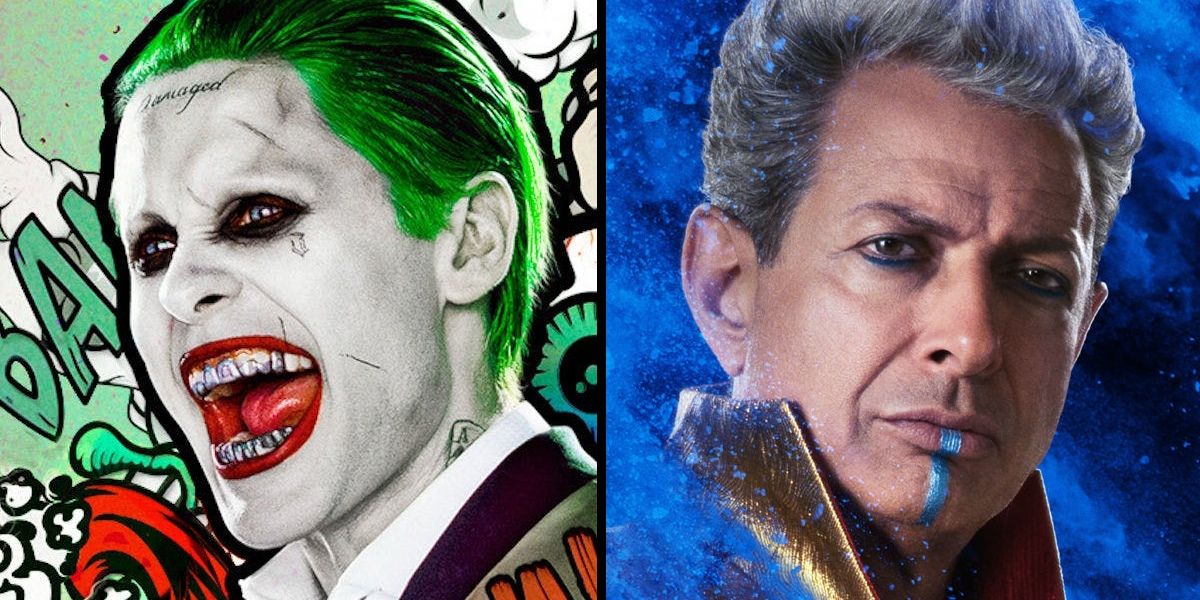Thor: Ragnarok is the answer to those seeking superhero comedy but the Marvel hit also answers another question: what if DC's Suicide Squad was a comedy? Sure, some will immediately dismiss or scoff at the suggestion that Marvel's runaway hit Thor adventure should be compared to, let alone deemed 'similar' to DC's most critically lambasted ensemble. But when your story revolves around a brutal, all-powerful ancient god out to enslave the innocent and the rag-tag group of warriors and rejects hoping to defeat her... a playful comparison is inevitable. What's really surprising is how the mirror images between Marvel's Revengers and DC's Suicide Squad only multiply from there.
It's far too late to change Squad from a gritty, edgy, uneven, super-criminal team-up into an irreverent comedy embracing slapstick and improvisation. And even if it could be done, the critical praise of Thor: Ragnarok is probably beyond even a comedic Squad's grasp. But in the interest of defining just where the line between 'good' and 'bad' ideas, or 'good' and 'bad' characters can be drawn, we're putting these two films under the microscope to see just how much DNA they share.
If nothing else, our SPOILER filled breakdown will illustrate what Suicide Squad was going for.. and maybe, just maybe, where Ragnarok was given a bit more slack.
RELATED: Does Thor: Ragnarok Try Too Hard To Be a Comedy?
Hela & Enchantress
We can start with what is the most obvious parallel, since both Ragnarok and Squad rely on a magical sorceress to appear essentially out of nowhere, and create an immediate threat for the heroes through predictable formula. They have spent centuries, if not millennia locked up so that peaceful, civilized life could prosper. When they are allowed to escape, they waste little time in restoring their former power, cloaking themselves in ethereal green wardrobe, transforming an existing army to their own mindless purposes, and beginning a conquest over... the world? The universe? It's not entirely clear. All the audience needs to know is that in the good old days (by their estimation), they were worshipped as goddesses, and after seeing the world forced to forget their power, are determined to demonstrate it.
Honestly, the personalities-- heck, even the voices of the characters are eerily similar, and both evolve their visual design over the film as a reflection of their power and their regal, mercurial nature. For Enchantress, her path to power comes through resurrecting her deceased brother with whom she once ruled, and relying on him for nothing much beyond acting as an attack dog against the hero team's powerhouse in the final act. For Hela, her path to power comes through resurrecting the Fenris Wolf - her brother in the comic books - whom she once rode into battle, and relies on him for nothing much beyond acting as her attack dog against the hero team's powerhouse in the final act.
For both, it's the fact that they share a symbiotic relationship with an object of importance to the hero that generates the conflict at all. Hela derives her power from Asgard, which Thor loves and is sworn to protect. Enchantress exists by taking June Moon as a host, whom Rick Flag loves and has sworn to protect. Others may see the odds stacked against them and rule retreat as the reasonable course... but neither Thor nor Rick can, which causes conflict with, and eventually admiration from their teammates. In the end, both must accept that their charge must be lost to defeat the villain. Thankfully, Rick Flag discovers June Moon has been freed - while Thor learns his father's wisdom that Asgard has been saved, since it is a people, and not a place.
Valkyrie & Deadshot
Next up, it's the 'Heroic Murdering Badass' - the character whose moral compass may be in doubt when first introduced, but whose skills in a fight are so outlandishly superhuman, so legendary and beyond question, that they don't just make the hero's own skills seem unimpressive, but make it at all possible that the villain could actually be defeated. For Valkyrie, it's her place among the most elite warriors of Asgard that proves her skills... and the loss of her beloved sisters in combat that leads her to sardonic self-isolation. For Deadshot, it's a montage showing his superhuman abilities with firearms, meaning that he simply "never misses"... and it's his defeat in front of and loss of his daughter that fuels his 'nothing to lose' attitude. Both reject the hero's call to action based on a moral imperative, leading the hero to judge that they are not the warriors they claim to be, having clearly forsaken the decency they had expected based on reputation.
In the end, however, both ascend to their true potential. But in both cases, an instant shift to the heroic would be too hard a sell - or make them seem less badass for instantly 'joining up' with the heroes. Valkyrie uses a desire to kill Hela as her excuse for joining the 'Revengers' on their mission of certain death. Deadshot takes a similarly cynical view of this 'Suicide Squad,' claiming that he'll kill the villain selfishly, so his daughter will know that her father was capable of the job. An irreverent toast of hard alcohol plays an interestingly identical role in their shift, but as both embrace their true calling as warriors, their heroism and determination to serve their duty overrides everything else. They aren't the 'hero,' per se, they just stopped resisting the character they had suppressed... and get to stay every bit the badass when the end credits roll.
Loki & Harley Quinn
Finally, it's the characters who make heroic sacrifice seem like a punchline, not cause for praise. Loki would be the villain of the piece - has been the villain of the piece - were it not for a greater evil intent on killing thousands, if not millions for the fun of it. Harley Quinn, in a literal sense, is a villain of the story (since that's exactly what Suicide Squad is all about). But both characters make sure to operate as Chaotic Neutral archetypes: where the lines of morality or law are drawn, they must cross them to reflect the truly heroic characters beside them. From the very start, both bear little connection to the actual narrative or stakes. And once the opportunity arises, they betray the heroes and descend... but never any farther than Neutral Evil. They're bad, murderous, and in no way heroic. Which is what makes their turn to truly heroic side of the equation so satisfying, thanks to a villain so evil they are forced to define their own sense of right and wrong.
Both tag along with the story's heroes, scheming every step of the way, and questioning the need to defeat the villain at all once they've landed somewhere soft with a secondary antagonist (which wee'll get to in a moment). Loki betrays Thor while attempting to board their escape vehicle, and Harley does the same. Yet Loki soon returns for no greater reason than basic loyalty and tribalism. Loki is still of Asgard, and won't let Asgardians be slaughtered. Harley is a criminal, but still attacks Enchantress for for simply "messing with her friends." Neither are evil for the sake of it, or when it crosses into senseless villainy. In their respective stories, that alone makes them a 'hero.'
Grandmaster & Joker, Hulk & Diablo, Korg & Croc, Skurge & Boomerang, Miek & Katana...
Grandmaster and the Joker. Both secondary antagonists. Both uncontrollable, uncontained, improvised explosions of id. Both heavily featured in marketing as opposing forces to the heroes, but ultimately serve as a speed bump to the actual narrative.
Hulk and Diablo. Both men of few words who resist the urge to play the part of hero, or even warrior to serve the hero's purposes (especially once Hulk transforms into the peaceful Banner). Giving in to their power is about weakness and rage, not glory... until the evil of the villain is revealed, and they sacrifice themselves to save the many - by engaging the villain's henchman in combat, and leaving the spotlight to the main heroes.
Korg and Croc, the otherworldly creatures who seem downright normal compared to the drives of the principle characters, and leap into heroics with little prodding, as if it is their very nature. Skurge and Boomerang, the accented hooligans who provide slapstick laughs and act as an audience surrogate to keep the pantomime of the villains in perspective. And Miek and Katana, who show up to wave blades impressively and... well, just that. But look downright unforgettable in the process.
-
The archetypes, characters similarities and mirror images in Thor: Ragnarok and Suicide Squad can likely be stretched to any number of stories and genres. But regardless of which you deem a success or failure, it's strange to see two entries in the superhero genre cleaved together in so many direct ways. If you've got a theory, a rebuttal, or a suggestion as to Ragnarok's Amanda Waller, please share it in the comments!

